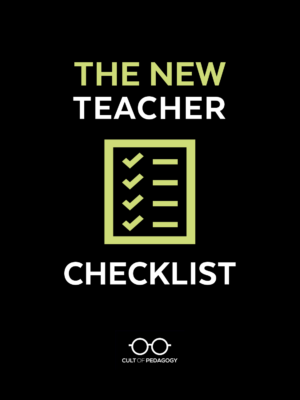What Advice Would You Give a Student Teacher?

This week, I got an email from someone who is just about to start student teaching. Feeling anxious about the semester ahead, she asked if I had any advice.
I’m going to share my own thoughts here, but I would like it if this could be one of my crowdsourcing posts, where we pull together all the collective wisdom of my incredibly smart, insightful readers (like the times you advised parents on skipping kindergarten and having your child take extra math courses). So after I share my ideas, I would love for everyone else to use the comments below to give all beginning teachers advice on how to make the most of the student teaching experience.
Okay. I’ll go first:
1. Ask All the Questions
Unless you’re very extroverted, you might hold back on asking questions. Maybe you don’t want to bother anyone or you don’t want to look stupid.
Try really hard to get over that. You need to be asking lots of questions this term: Questions about classroom procedures, grading, and technology. Questions about how your host teachers handle tricky situations, how they manage to steal bathroom breaks, and how they determine whether an 89% is an A or a B. If you don’t ask, you’re not going to learn.
If you feel like you’re taking up a lot of your host teacher’s time, keep a list of questions as you think of them, then ask several at once. Or ask different people different questions, so you’re not “bothering” the same people all the time. Seriously, though, it’s really not a bother. Most experienced professionals love sharing their expertise, so ask away.
2. Get a Buddy
When I did my student teaching at Penn State, my friend Dan had also been assigned to the same school. Everyone in my program had been placed in schools all over Pennsylvania, so we were pretty isolated, and it was a huge blessing to have Dan around. We didn’t have much chance to talk during the school day, but about once a week we would have dinner and talk about things that were going well and things that weren’t. We asked each other the stupid questions we were afraid to ask anyone else. And we gossiped like crazy. It was a great stress reliever, and it really helped to have another “outsider” to talk to.
If you don’t have another student teacher in your building to share the experience with, find someone else in your program and set up some kind of regular check-in. If that’s not an option, look around online for a community. Find someone who gets you, someone who has a similar amount of pressure on them, and schedule time to hang out. You’ll be glad you did.
3. Observe Like Crazy
The best way to learn what good teaching looks like, and what not-so-good teaching looks like, is to observe LOTS of teachers. Chances are your program is going to require you to do a certain number of these; my advice is to triple that number. Use your planning period to sit in the back of someone else’s classroom; grade papers if you need to multitask. You’ll still pick up plenty of instructional techniques and tweaks, bits of presentation flair, and classroom management strategies. You’ll get cool ideas for organizing materials, establishing good procedures, and even decorating a classroom.
Although it’s vital to observe teachers in the same content areas and grade levels as yours, observing outside these parameters will also be hugely informative, so seek out teachers who teach something different from you. And don’t limit your observations to classroom instruction: Sit in while a colleague makes a parent phone call (those are tough, and there’s an art to it). Attend an IEP meeting if you are allowed. Watch a colleague coach a sports team or run a club meeting.
How do you ask for these observations? Just tell the teacher in question that you want to observe in as many classrooms as possible, then ask if you can stop by 5th period. Simple as that. They will almost always say yes.
4. Network
Just like substitute teaching, student teaching is an excellent opportunity to get to know lots of people in your field, which can eventually lead to securing a full-time position. Schools are much more likely to hire someone whose work they are familiar with, so make sure people get to know you during your student teaching semester. This means going to the social events, introducing yourself to people you don’t know, eating lunch in the staff room (at least sometimes) and putting your hand up when volunteers are needed to sell tickets at the basketball game. Every person you meet is a potential connection for later employment, so make lots of connections now.
5. Put Together a Professional Wardrobe
This is an area that a lot of student teachers get wrong. In general, when dressing for school, your clothes should be a little more conservative and a little more dressed up than what you usually wear. If you are young (in your early twenties) and are teaching students who are older (i.e., high school) this is especially important because you need to look different from your students. Before school even starts, learn your host school’s dress code for teachers and follow it, keeping in mind that some of the other teachers in your school may not necessarily do so. Never mind that: You don’t have the seniority to thumb your nose at any dress code. Follow it. And for those gray areas, if you have even a tiny doubt about something you’re wearing (Is this too low-cut? Too tight? Would this t-shirt offend anyone?), don’t wear it.
For inspiration, women should start by searching for Teacher Fashion on Pinterest, then check out The Styled Teacher‘s blog, where you can find tons of photos of ensembles that are beautiful AND appropriate for the classroom. For men, Pinterest also has a lot of great ideas for male teacher fashion, and check out this article on building a male teacher’s wardrobe from Real Men Real Style.
6. Clean Up Your Social Media
If you haven’t already done so, you need to SCRUB every one of your social media accounts until they sparkle. Untag yourself from incriminating photos, delete any posts that might be considered controversial, un-like any pages that might cause administrators, parents, or students to make unflattering assumptions about you. Switch public settings to private when it is reasonable to do so. Basically, look at your online footprint through the eyes of an administrator who is thinking about hiring you, and remove anything they might object to. You are about to begin the phase of your life when you are no longer just a private citizen; part of you is now somewhat public-facing, so your online presence needs to be professional.
If you think your students are going to want to connect with you on social media, go ahead and set up a “teacher” account right now (e.g., Mrs. G’s Instagram Account), where you will refrain from posting your real-real-life stuff, and send students there.
7. Take Small Bites
Remember: This is just practice. You are not expected to be able to know everything and do everything, and you’re certainly not expected to do it all well. So when you start to feel overwhelmed by all the things you’re supposed to be learning and all the other things you could be trying, just remind yourself to take small bites right now. Good teachers spend their whole careers trying to get it right, and some of the very best will tell you they still have a lot to learn, so cut yourself some slack.
8. Keep a “Next Year” Notebook
It’s human nature to think you’re going to remember all the ideas you come up with this semester, all the lessons you learn, all the things you want to do differently next time around. I’m here to tell you that you won’t remember half of them if you don’t write them down.
9. Find Your Marigold
If you’ve never read my article about teachers and marigolds, go read it now. I’ll wait.
Okay, that applies to student teachers too. To really have a wonderful student teaching experience, you need to find one person in the building who embodies everything you want to be in a teacher, then spend as much time with them as you can. If you’re very lucky, this could be the person who has been assigned to be your host teacher. If it’s not, go find them. It will make all the difference in the world.
More Advice to Come…
Okay, I’m done for now. I hope this has been helpful. Now I want to hear from the rest of my readers. In the comments below, share your advice for student teachers. Let’s usher in the next batch of newbies with gusto. ♥
